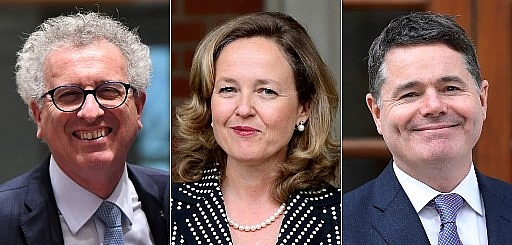Eurozone picks new chief as pandemic recession looms
 |
| This combination of file pictures made on June 10, 2020, shows (L-R) Luxembourg's Finance Minister Pierre Gramegna on December 4, 2017, in Brussels; Spain's Minister for Economic Affairs Nadia Calvino on June 8, 2018, in Madrid; and Ireland's Finance Minister Paschal Donohoe on October 8, 2019, in Dublin. The new head of the Eurogroup will replace Mario Centeno, Portugal's soft-spoken finance minister who is stepping down after just two-and-a-half years. Luxembourg's Finance Minister Pierre Gramegna, Spain's Nadia Calvino, and Ireland's Paschal Donohoe, are among three names strongly rumoured to replace Centeno.Emmanuel DUNAND, (Javier SORIANO, Paul FAITH / AFP) |
Among the 19 ministers, three have bid for the post: Spain's Nadia Calvino, the favourite who is part of Madrid's left-wing government, Ireland's centre-right Paschal Donohoe and Luxembourg centrist Pierre Gramegna.
The job is considered one of the Europe's key positions, along with the heads of the European Commission, EU Council and the European Parliament.
"We have three excellent candidates who have gathered support from their peers," said the outgoing Eurogroup chief Mario Centeno of Portugal.
"This tight race and this level of applications shows the Eurogroup is more important and influential than ever," he said ahead of the meeting to decide his successor.
Whoever wins will be tasked with watching over a massive EU recovery plan that is still in negotiation as well as reviving stalled reforms of the single currency that is widely seen as needing fixing.
The eurozone economy is set to contract by a record 8.7 percent this year, with mass unemployment and other dire consequences still a possibility.
51-year-old Calvino, who would become the first woman to lead the Eurogroup, has the support of German Chancellor Angela Merkel and the countries of the south.
But "she also has major opposition from the Dutch and that whole gang who say 'they'd rather die'," said a European source.
Her opponents, mainly from free-market leaning member states, say the job requires compromise between countries of the north, who adhere to budgetary discipline, and those in the south, who are considered to be more lax.
The north-south split has taken on even greater importance as countries negotiate the 750 billion euro recovery plan.
Known as the "Frugal Four", the Netherlands, Austria, Sweden and Denmark, have doubts about the necessity for a massive wave of EU spending.
Of the four, Sweden and Denmark are not in the eurozone.
Opposite them are Italy and Spain who see the plan as necessary to help Europe and show solidarity with countries hit hardest by the pandemic.
"Spain has a very strong position at the moment in this discussion, which is going to be the heart of the affairs at the Eurogroup," said the European source.
Given those concerns, the two outsiders are believed to have a shot at beating Calvino.
Donohoe last week gained the support of the European People's Party that unites the European conservatives, including Merkel's CDU in Germany.
The 45-year-old Irishman is regarded as a prudent caretaker who kept his country on the right track after the ravages of the eurozone debt crisis.
"He has a serious chance, because it's going to be difficult for Nadia Calvino to get 10 votes," a European diplomat said.
Former diplomat Gramegna, 62, is a veteran of the Eurogroup, which he has been attending since 2013.
He tried his luck in 2017 against soft-spoken Centeno, who is stepping down after a single term that did not leave a strong impression.
What the stars mean:
★ Poor ★ ★ Promising ★★★ Good ★★★★ Very good ★★★★★ Exceptional
Related Contents
Latest News
More News
- The generics industry: unlocking new growth drivers (February 04, 2026 | 17:39)
- Vietnam ready to increase purchases of US goods (February 04, 2026 | 15:55)
- Steel industry faces challenges in 2026 (February 03, 2026 | 17:20)
- State corporations poised to drive 2026 growth (February 03, 2026 | 13:58)
- Why high-tech talent will define Vietnam’s growth (February 02, 2026 | 10:47)
- FMCG resilience amid varying storms (February 02, 2026 | 10:00)
- Customs reforms strengthen business confidence, support trade growth (February 01, 2026 | 08:20)
- Vietnam and US to launch sixth trade negotiation round (January 30, 2026 | 15:19)
- Digital publishing emerges as key growth driver in Vietnam (January 30, 2026 | 10:59)
- EVN signs key contract for Tri An hydropower expansion (January 30, 2026 | 10:57)

 Tag:
Tag:




















 Mobile Version
Mobile Version